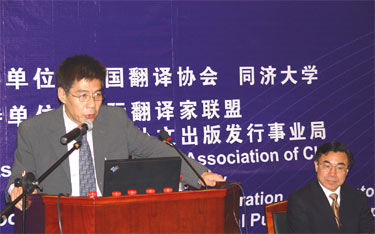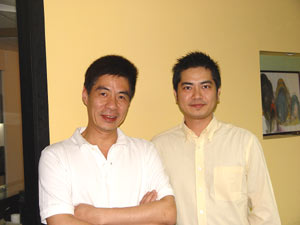| Tools: Save | Print | E-mail | Most Read |
| Interview: Reflections on China's Translation Industry |
| Adjust font size: |
Is China's translation market flourishing? The answer is "yes" from an international forum on the translation industry held in Shanghai on May 28 and 29. But we heard a different point of view from Alfred Feng, managing director of Linguitronics (LT) Co Ltd, the largest Taiwan-invested translation agency in Shanghai.
"A poll by the Localization Industry Standards Association (LISA) shows that the output value of China's translation sector hit 10 billion yuan (US$1.25 billion) in 2003, while official statistics indicate the figure to be four times that," Feng said in an exclusive interview with china.org.cn. "All signs suggest that there exists a huge and rapidly growing language service market in the mainland," he continued. "Nonetheless, we should be fully aware of the problems that obstruct the further development of the industry. "Far from a mature market, a majority of translators in the mainland are doing 'one-way' translation -- translating other languages into Chinese," he pointed out. Elite Translation Co Ltd is LT's Taiwan-based parent company founded by Feng in 1992. Citing it as an example, Feng said its annual turnover of US$5 million was on a fifty-fifty basis -- 50 percent from translating foreign languages into Chinese and 50 percent from translating Chinese into foreign languages. He described the former as "localization" and the latter "globalization." The goal of globalization achieved through translation has resulted in Taiwan-made products being familiar to overseas customers. Most mainland enterprises lagged far behind their Taiwan counterparts in terms of management strategies and industrial distribution on a global basis. "They are not ready to compete in the world market," Feng said. "The unbalanced translation service mirrors the current situation." In 2002 Feng set up LT in Shanghai. In the past four years he has witnessed at least two local translation agencies going public. "It all happened in a very short space of time," he said, "from their issuing stocks to incurring debts, delisting and eventually closing down. Actually, everything was predictable from the day they were listed." Translation is not a sector in which people can become rich overnight, Feng stressed. However, too many entrepreneurs, reluctant to get down to hard work, have dreamed of making big money with a small investment. For instance, no one seemed to have taken any interest in importing technology, establishing standards for the industry, formulating management principles and tactics, training professionals and the like, Feng noted. Equipped with capital and advanced managerial experience, Feng originally intended to carry out his ambitious plan in Shanghai -- China's biggest economic center. Nonetheless, he felt disappointed very soon because "we couldn't employ qualified translators." In his company Feng has insisted that only native speakers be used to translate Chinese into other languages. Mainland employees, whose monthly salary Feng said is much higher than the average of most people in the city, are required to do the reverse translations. "Though holding different kinds of qualification certificates issued by their schools, they're far from professional translators," Feng said. "Poor reading comprehension, plus a lack of basic knowledge in specialist subjects, has made many of them incompetent for translation work." "We have no alternative but to spend one year or so improving their foreign languages and then another three to five years broadening the range of their knowledge," he continued. "Unfortunately, all these remedial measures are of no avail to help improve their mother language." In fact, many domestic and even overseas enterprises have been shocked to witness Chinese students' low writing ability in their own language, according to Feng. He blamed this on the country's education system. Eager for quick results and instant profits, a large number of the schools have been happy to grant credentials after offering short-term training courses. Recently they have become interested in training simultaneous interpreters. "Actually, within the translation industry the output value of simultaneous interpretation only accounts for 2-3 percent of the business," Feng noted. These are short-sighted acts and not aimed at creating truly competent personnel, he said. "Qualified translators need to have encyclopedic knowledge and therefore their training takes much longer than for lawyers, accountants or even physicians," Feng said. "As the saying goes, 'It takes ten years to grow trees, but a hundred to cultivate people.' However, many of our schools don't even want to 'waste' the ten years for tree-planting. It has long since been borne out by history that a desire for quick success, in the end, can only spoil things."
Feng's company is planning to open a joint-ventured training center in Nanjing, capital of Jiangsu Province, to train more professional translators. Strictly speaking, translation as an industry has just made a start on the mainland. "I don't have a cure-all for the above problems," Feng admitted. "As China becomes integrated into the world economy, hopefully the process will become an eye-opener for entrepreneurs who are still learning the ropes bit by bit. Fewer daydreams about becoming rich, more practical deeds, then a regulated and healthy market can be established." (China.org.cn by staff reporter Shao Da, July 3, 2006) |
| Tools: Save | Print | E-mail | Most Read |
 |
| Related Stories |
|
| Product Directory China Search |
Country Search Hot Buys |

